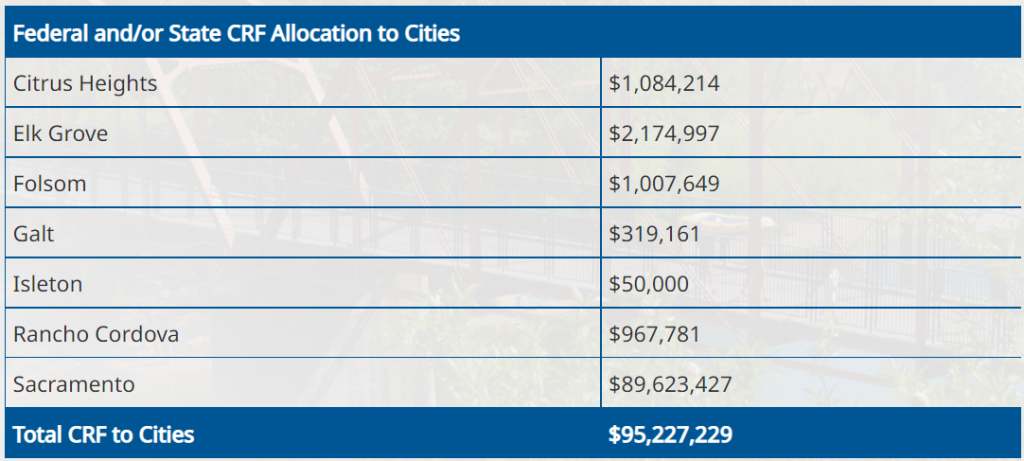The Board of Supervisors, at its April 27 meeting, approved a response to a Feb. 14 Grand Jury report claiming that the Board abandoned responsibility for the COVID-19 CARES Act spending, saying it “disagreed wholly” with most of the findings.
“The use of CARES Act funding has been examined by an independent auditor, who found no misuse of those or any other federal funds. The Board was actively engaged in the County’s pandemic response.”
,District 5 Supervisor and Board Chair Don Nottoli
As required by the Single Audit Act, the County is audited annually for the use of federal funds, such as CARES Act funds, by an external, independent auditor. The external audit firm reviewed federal expenditure for fiscal years 2019-20 and 2020-21 and had no findings of misuse.
The Grand Jury report includes 14 findings and five recommendations related to the information in the report. The Board wholly disagreed with seven of the Grand Jury’s findings, partially disagreed with two and agreed with one.
The County did not respond to the finding that the Sheriff’s Office did not enforce the Public Health Order, as the Board does not have decision-making authority over that office.
Additionally, the County did not respond to three of the findings as they were related specifically to the City of Sacramento.
Following are the Grand Jury’s findings and recommendations from the report and a summary of the County’s responses. Read full Grand Jury response here.
Findings and Responses
F1: The Sacramento County Board of Supervisors abdicated its responsibility to determine community needs and to provide oversight in the development and implementation of the County COVID-19 response.
R: Disagree. Given the urgent need for a response that was not delayed due to administrative processes, the Board adopted resolutions to authorize County staff, including the directors of Health Services and Human Assistance, to respond to the emergency and accept COVID-19 related funding.
F2: The Sacramento County Board of Supervisors used the vast majority of the CARES Act funding it received to augment the county budget and support county operations while providing minimal support to the Sacramento County Health Department or other County agencies to address community needs resulting from the COVID-19 pandemic, neglecting its public support responsibility.
R: Disagree. The County health department and other County agencies are part of the County and included in the County’s budget, so providing additional funding to those departments effectively requires augmenting the County’s budget.
Of the $206 million in CRF received from both the Federal and State government, a total of $72.2 million was provided to the County’s Department of Health Services (DHS). DHS also received $110.7 million in other COVID-19-related grant funding, bringing the total resources allocated to DHS to $182.9 million.
F3: The vast majority of the Sacramento County CARES Act dollars were used to fund County operations. No funds were distributed to the cities within the County to assist their effort to directly address the COVID-19 pandemic.
R: Agree. The County and all cities within Sacramento County received CRF funding either directly from the federal government or as a pass-through from the state.
However, the County is the only jurisdiction within Sacramento County that has a designated public health responsibility and is the lead agency for COVID-19 response countywide, including for all cities within the County.

F4: Each department within the Sacramento County Administration had to create its own action plan to address the COVID-19 pandemic because there was no overarching County Plan nor was specific direction provided from the County Executive regarding these action plans.
R: Disagree. Between March 5 and Dec. 31, 2020, the County Administration issued more than 50 communications to departments and employees regarding COVID-19 response, including the COVID-19 Prevention Program policy and guidelines. Each department was required to have worksite-specific plans based on County policy and guidelines for COVID-19 prevention.
F5: The Sheriff’s Department final FY 2019-2020 budget was not increased due to the use of CARES Act funding of $104.2 million. At year-end closing, Sacramento County provided the Sheriff’s Department with $104.2 million of CARES Act funds, and removed an equivalent amount of General Funds from the Sheriff’s Department. The Sheriff used these CARES Act funds for standard non-COVID-19 operations. The Grand Jury was unable to determine if the switching of funds was in compliance with federal CARES Act requirements.
R: Disagree partially. Agree that the Sheriff’s Department budget was not increased due to the use of CRF funding. Disagree that the Sheriff’s Department was engaged in standard non-COVID-19 operations. The Sheriff’s Department was required to adjust operations due to the public health emergency to continue providing public safety services. All CRF funds were spent in compliance with federal requirements.
F6: Sacramento County’s allocation of the majority of CARES Act funds to the Sheriff’s Department achieved several benefits. It ensured there was no loss of CARES Act funds, provided the County with greater financial flexibility in funding services, and addressed the COVID-19 emergency. The Grand Jury was unable to determine if the switching of funds was in compliance with federal CARES Act requirements.
R: Disagree partially. Agree that funding eligible expenditures in the Sheriff’s Department achieved several benefits, including ensuring there was no loss of CRF funds and providing the County with greater flexibility to fund County services. Disagree that it is unclear if applying CRF in this way was in compliance with federal CARES Act requirements. All CRF funds were spent in compliance with federal requirements.
F7: The County Executive’s decision to allocate 70% of Sacramento County’s FY2019/2020 CARES Act expenditures to the Sheriff’s Department ignored many of the critical public health needs to contain the spread of COVID-19. The Grand Jury was unable to determine if this action was in compliance with federal CARES Act requirements.
R: Disagree. All CRF requests submitted by Health Services related to the COVID-19 public health response were prioritized for funding and all requests utilizing CRF or other available sources were funded. All CRF funds were spent in compliance with federal requirements.
F9: The CARES Act prohibited use of its funds for already budgeted staffing activities. But these CARES Act funded “public safety” employees simply continued to perform their same duties as they had prior to the start of the COVID-19 pandemic. The Grand Jury was unable to determine if this action was in compliance with federal CARES Act requirements.
R: Disagree. All CRF funds were spent in compliance with federal requirements.
F10: The Board of Supervisors, the County Executive, and the Sheriff’s Department were not transparent in the use of the CARES Act funds. There was no written notice provided in the Board meeting agenda nor explanation within the Board Packet meeting materials regarding the replacement of allocated Sheriff’s Department General Funds with CARES Act funds.
R: Disagree. All actions requiring Board approval went to the Board. A status update on the use of CRF revenue was provided to the Board on August 11, 2020.
F11: The lack of governance and oversight by the Board of Supervisors allowed the County Executive to violate the first goal of the County’s stated criteria for use of CARES Act funds.
R: Disagree. All CRF funds were spent in compliance with federal requirements and in a way that provided the needed funding beyond the December 30, 2020 CRF expenditure deadline to achieve the first goal of addressing critical public health needs to contain the spread of COVID-19.
Recommendations and Responses:
R1: The Board of Supervisors should appoint an independent panel by June 2022 to conduct an audit to determine whether County actions were, in fact, in compliance with federal CARES Act requirements.
R: The recommendation will not be implemented because it is not warranted. The CRF program was audited as a major program by the County’s external auditors for both FY 2019-20 and FY 2020-21 with no findings reported.
R2: The Sacramento Board of Supervisors, the County Executive, and the Sheriff’s Department should each adopt a transparent and properly noticed budget allocation and approval process to be used upon receipt by the County for all funding sources, including surplus dollars. This process should include adequate notice, extensive engagement with county residents, and utilize detailed public notices, media briefings, stakeholder workshops and appropriate social media outreach. This recommendation should be in place by December 2022.
R: The recommendation has already been implemented. On June 10, 2021, the Board of Supervisors approved a Community Engagement Plan for the FY 2022-23 budget in order to increase public engagement in and understanding of the County’s budget.
R3: The County Board of Supervisors should engage in an active process to identify and address community needs and develop a plan to deliver appropriate funding and services to the community outside of County operations. A policy should be developed and approved to ensure community input in the use of supplemental emergency funding by December 2022.
R: The recommendation will not be implemented because these specific actions and processes are already in place. The County Board of Supervisors approved a Community Engagement Plan for the FY 2022-23 County Budget and the County continues to engage in active processes to identify and address community needs.
R4: A policy should be developed by the County Board of Supervisors directing the County Executive to provide clear and specific direction and oversight to county operations to ensure that the Board’s plans and strategic directions in response to community emergencies are properly carried out. This policy should be developed and approved by December 2022.
R: The recommendation will not be implemented because a policy is not warranted to ensure that the response to community emergencies are properly carried out as this is already established under numerous federal, state and local laws. The County has sufficient delegations of authority and a separate policy would dilute and confuse the intentions of the delegations of authority.
R5: A policy should be developed by County Board of Supervisors to require that the County Executive provide monthly updates on the use of special funding. This policy should be developed and approved by December 2022.
R: The recommendation will not be implemented because all ARPA funding allocations and specific project, contract, and budget approvals are subject to Board action at public meetings. Additionally, the Board has directed staff to provide quarterly updates related to the use of ARPA funding.














